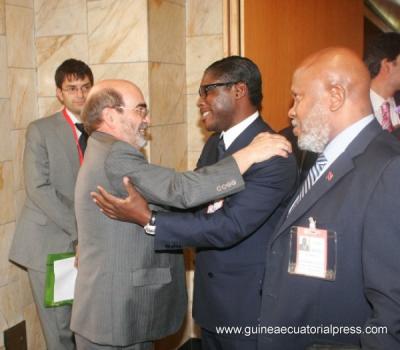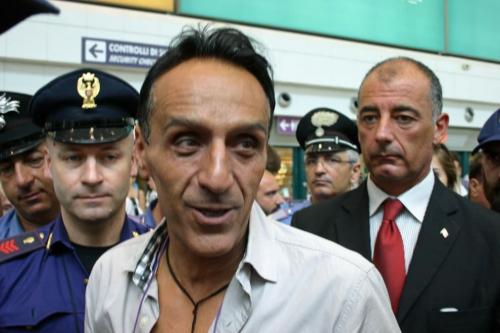Entrepreneur's ordeal exposes Equatorial Guinea brutality

Rome—The Italian businessman held in a central African prison for two and a half years has described his ordeal and denounced the autocratic regime that, he says, arrested him on trumped up charges and brutally violated his human rights.
Roberto Berardi, aged 50, was arrested in 2012 after falling out with Teodorin Nguema Obiang, the vice-president of Equatorial Guinea and eldest son of the country’s dictator, Teodoro Obiang Nguema Mbasogo, who came to power in a military coup in 1979.
The two men had set up a joint venture to provide construction services in the agro-indsutry and defence sectors and Berardi was arrested after discovering that his playboy partner allegedly had been systematically plundering the financial resources of their company.
Berardi, a native of Latina, was beaten, held in isolation in a dark cell, and denied food and medicine during his Kafkaesque ordeal.
His daughter has told how some of his fellow prisoners helped to keep him alive by grinding up bread and passing it to him under his cell door.
“Before this experience I didn’t know what terror was. I discovered that it’s not so much fear for yourself. True terror was when they tortured my neighbours in the cell next to me. Hearing those cries and blows every night was terrible. It destroys you psychologically. It was more frightening than when I was beaten myself,” Berardi said.
Looking gaunt after losing 30 kilos (66 pounds) during his incarceration, Berardi said he was determined to do something to help other people exposed to the caprices and cruelty of one of Africa’s most durable dictatorships.
“The prisons there are full of innocent people who are tortured, as well as of foreigners, who are exposed to the worst violence. They are robbed of all they have, thrown in jail and then expelled from the country on their release,” the construction engineer told a press conference at Amnesty International’s Rome headquarters.
Berardi acknowledged that he had been unwise to go into business with the vice-president. “I was aware of the opacity of this individual,” he said. “I wasn’t concerned about the ruling family’s political behaviour. Unfortunately I have paid a high price for it.”
Berardi broke with Teodorin after discovering that the heir to the ruling dynasty was siphoning money from their joint venture, Eloba Construction, and transferring it to bank accounts in the United States. He believes he was imprisoned to prevent him from cooperating with corruption investigators in France and America.
The latter have accused Teodorin Obiang of funding a lavish lifestyle through extortion, misappropriation, embezzlement and theft of public funds. Teodorin used his ill-gotten wealth to amass a collection of luxury sports cars, reportedly enabling him to switch their colours to match the changing colour of his shoes.
He also indulged a passion for Michael Jackson memorabilia, acquiring a crystal-encrusted glove for dlrs 275,000, a pair of crystal-covered socks for dlrs 80,000, three fedora hats used by the singer for dlrs 162,000, and six lifesize statues of his hero. More serious investments included a Malibu mansion and a Gulfstream jet.
Equatorial Guinea has seen an oil-fuelled economic boom over the last three decades, becoming the richest country per capita in Africa. Yet two thirds of the population live on less than 1 dollar a day and 20 percent of children die before the age of five.
Human rights organisations have repeatedly denounced the Obiang regime. Nine prisoners were executed in January and prisoners were routinely tortured, Amnesty International said in its latest report on “The State of the World’s Human Rights”.
“Several political opponents were arbitrarily arrested and held incommunicado for long periods without charge, including one man abducted from a neighbouring country,” the organisation said. “Torture by the security forces continued with impunity.”
“This is a country that is run in a terrible manner. What I saw in prison was like a horror movie,” Berardi said.
The businessman said he had been badly let down by Spanish diplomatic authorities, who represent European interests in their former colony. The Spanish consul had visited him shortly after his arrest and extracted an assurance from the police – run by one of Teodorin’s brothers – that the 72-hour limit on detention would be respected.
Berardi was held illegally for 45 days but didn’t see the consul again. Even worse, having escaped from prison, he sought refuge at the Spanish consulate only to find the door locked against him. “I had to return to prison, using the same channel I had used to get out,” he said.
Three other Italians are currently in prison in Equatorial Guinea and another two are being held under house arrest, in what Berardi says is an attempt to protect the internationally discredited regime by holding foreign hostages.
“The Equatorial Guinea regime has come to the end of the road. They need hostages in order to negotiate with us,” he said. “You can’t negotiate with them using normal diplomatic methods. You simply have to impose your will, doing whatever it takes.”



